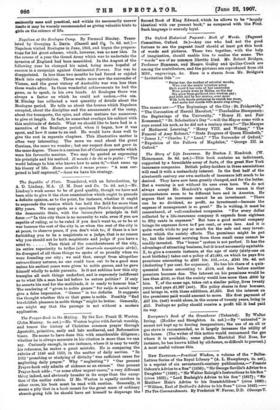The Story of Life Insurance. By .Burton J. Hendrick. (W.
Heinemann. 3s. ad. net.)—This book contains an indictment, supported by a formidable array of facts, of the great New York insurance companies. British policy-holders in these associations will read it with a melancholy interest. In the first half of the nineteenth century our own methods of insurance left much to be desired. They have now been greatly changed, and for the better. But a warning is not without its uses even here. We do not always accept Mr. Hendrick's opinions. One reason is that circumstances seem to be different here and in America. He argues that an insurance cannot be an investment. "There can be no dividend, no profit, no investment—because the expense of management is so great." He is writing, it must be- remembered, of well-conducted companies. "For every dollar collected by a life-insurance company it expends from eighteen. to fifty cents in expenses." But here a good mutual company brings its expenses down to tl per cent., or even less. And it is quite worth while to pay so much for the Safe and easy invest- merit which the society effects. The premiums might be put by, but the interest accruing from these small sums cannot be readily invested. The " bonus " system is not perfect: It has the advantage of attracting business, but it is not necessarily equitable. X, to give a concrete instance, at the age of sixty (sixty-one on next birthday) takes out a policy of 41,000, on which he pays five premiums amounting to 4367 10s. 10d.,--i.e., 4341 16s. 4d, net (deducting 7 per cent. for expenses). He has his share of a quin- quennial bonus amounting to 4118, and dies before another premium becomes due. The interest on his premiums would be lees than 4100, so that the society would lose more than 4600 by him. Y, of the same age, takes out a similar policy, lives twenty years, and pays 41,867 (net). His policy shares in four bonuses, and brings in, with these additions, 41,655. But the interest on the premiums paid would amount to more. His first payment of 467 10s. (net) would alone, in the course of twenty years, bring in £55. Perhaps no policy should receive a profit till it had paid its way.










































 Previous page
Previous page